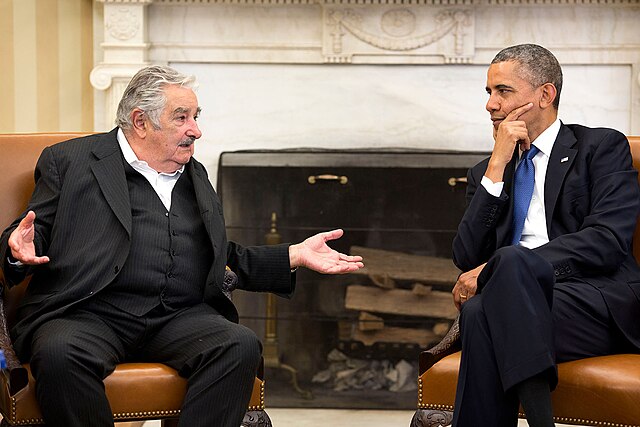José Alberto "Pepe" Mujica Cordano is a Uruguayan politician, former revolutionary and farmer who served as the 40th president of Uruguay from 2010 to 2015. A former guerrilla with the Tupamaros, he was tortured and imprisoned for 14 years during the military dictatorship in the 1970s and 1980s. A member of the Broad Front coalition of left-wing parties, Mujica was Minister of Livestock, Agriculture, and Fisheries from 2005 to 2008 and a Senator afterwards. As the candidate of the Broad Front, he won the 2009 presidential election and took office as president on 1 March 2010. He was the Second Gentleman of Uruguay from 13 September 2017 to 1 March 2020, when his wife Lucia Topolansky was vice president under his immediate predecessor and successor, Tabaré Vázquez.
Mujica in 2023
Mujica with the President of Brazil, Luiz Inácio Lula da Silva, in 2010
Mujica with the President of the United States, Barack Obama, at the White House in 2014
Mujica and President of Argentina, Cristina Fernández de Kirchner, with the President of Russia, Vladimir Putin, in 2014
Civic-military dictatorship of Uruguay
The civic-military dictatorship of Uruguay (1973–85), also known as the Uruguayan Dictatorship, was an authoritarian military dictatorship that ruled Uruguay for 12 years, from June 27, 1973 until March 1, 1985. The dictatorship has been the subject of much controversy due to its violations of human rights, use of torture, and the unexplained disappearances of many Uruguayans. The term "civic-military" refers to the military regime's relatively gradual usurpation of power from civilian presidents who continued to serve as head of state, which distinguished it from dictatorships in other South American countries in which senior military officers immediately seized power and directly served as head of state.
Uruguay's disappeared people





